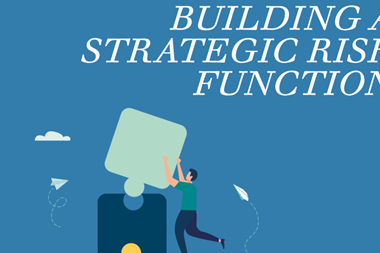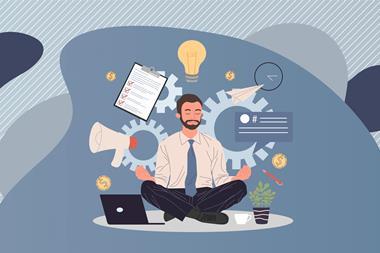Tackling mental health is not just the right thing to do, but an essential exercise in risk management, according to International SOS’ Dr Rodrigo Rodriguez-Fernandez.
The COVID-crisis has led to a shift in how employers’ attitudes towards mental health and workplace wellbeing. Employers are recognising they have a duty of care to ensure health and wellbeing at work, and that efforts to improve mental health can directly benefit the bottom line.
Nine months into the pandemic, the proportion of UK adults who said they were “coping well with the stress of the pandemic” had fallen from almost three quarters in April 2020 to 62% in November 2020, according to research from the Mental Health Foundation. Feelings of loneliness had grown significantly from 10% to 25%, a quarter of all adults, during the same period.
The COVID-crisis has exacerbated mental distress in three key ways, according to Dr Rodrigo Rodriguez-Fernandez, global medical director of non-communicable disease and workplace wellness at International SOS.
First there are the issues associated with long COVID, which are not yet fully understood. “We know that cases where individuals have been in the intensive care unit have an 80% greater likelihood of having PTSD,” he explains. “Even for those who have not been in an ICU, 30% have some form of PTSD, anxiety or depression.”
Then there are the indirect impacts of the pandemic. “The balance between life and work are completely disappearing,” says Dr Rodriguez-Fernandez. “We are working in our kitchens with our families around us. There is a deprivation of touch and human interaction along with the uncertainty of job continuity and economic circumstances.”
“The third element is the overstrain on the healthcare system,” he adds. “If somebody had an existing mental health condition they probably haven’t had the same follow up. Appointments have been postponed or they may be afraid to leave their house. They don’t want to do another Zoom call to see their therapist.”
On the risk radar
Risk consultants like International SOS are increasingly called upon to provide an outsourced chief medical officer (CMO) role for many organisations that previously did not invest in this area. And many of the inquiries are being driven by risk professionals who understand the link between poor mental health and business continuity.
“Our first point of contact is usually risk professionals,” says Rodriguez-Fernandez. “With the pandemic organisations have often created crisis management, or pandemic preparedness, teams and those are usually a combination of the head of risk, HR, health and safety and a number of other functions.”
He says the pandemic and lockdowns have been a “pressure cooker” for many organisations. “It’s exposed where the cracks are”.
Almost one in three risk professionals see mental health issues as likely to cause a decrease in employee productivity in 2021, according to International SOS’ Risk Outlook 2021. Experts predict organisations could be faced with more employees on sick leave due to mental health issues than COVID-19 symptoms over the next 12 months.
There are other emerging trends from a mental health perspective. Older employees are facing increased stress levels through lack of contact with stakeholders and heads of department. Meanwhile, younger staff members are facing increased stress through lack of hands-on training and mentoring.
International communications can help to mitigate these feelings of isolation with virtual Town Halls becoming a popular way with which company leaders can engage with staff. Over the course of the pandemic, such engagement has become less formal and more inclusive, notes Rodriguez-Fernandez.
He says businesses face a significant exposure to this growing mental health crisis. “It’s not only on the medical side but also the business continuity side. If in Q2 you have 25% or 30% of your workforce on long-term sick leave with depression, what does that mean for the organisation?”
Businesses are waking up to the strong correlation between mental health and workplace productivity. The top five mental health challenges affecting productivity since the COVID-19 pandemic began, according to a study by Qualtrics, are:
- Difficulty concentrating (28.3%)
- Taking longer to do a task (20%)
- Difficulty thinking, reasoning or deciding (14.7%)
- Putting off challenging work (12.4%)
- Difficulty juggling tasks or responsibilities (11.8%)
“The simple fact that my week calendar is just talking about mental health with companies shows they understand the importance of this,” says Dr Rodriguez-Fernandez. “We just finalised a mental health survey with a large multinational company. Not surprising we saw a very clear correlation between someone has stress, anxiety and depression and their on-the-job performance.”
It is clear that businesses which were once dismissive of mental health issues have now woken up to its importance, he thinks.
“Organisations used to say, ‘We’re not in the business of health’ and healthcare was left to the state or government. Now, because we work in our homes and there are blurred lines they clearly understand you can’t separate an employee’s private life from their work life.”
“The duty of care has changed in employers’ eyes and they’re recognising the workplace is a place that can be conducive to health.”
“We’ve heard some folks say that ‘now every company is a healthcare company’. From our perspective, we’ve never seen this level of engagement with the C-suite in every single sector and industry at once.”
Tips for overcoming ‘pandemic fatigue’
(Source: International SOS)
Take steps to check in individually with every employee
This may appear an obvious first move to implement regarding maintaining a robust mental wellness strategy, but it is nonetheless an essential one. It is important for businesses to treat every employee as an individual; different people will be responding to the stress brought on by the pandemic in different ways and it will be causing a range of mental health issues for many employees. The first step towards recognising these comes with actively checking in with employees in a one-to-one situation, as this can allow businesses to form a greater understanding of how they’re coping through this particularly difficult period. This can also be done by carrying out Mental Health or Resilience Surveys with tools that have scientifically been validated and can uncover individual pain points.
Make sure people have and are aware of secure routes for reporting their mental health issues
Strategies which activity look to engage with employees and directly ask them about how they’re doing should be accompanied by more subtle routes for people to gain help. Often people may feel intimidated to discuss their mental health with the colleagues and manager they work with on a day-to-day basis, as they may have anxiety about the way they’re perceived. To counter this issue it is important that employees are able to discuss their mental health issues with people within a business away from their direct teams, preferably a HR manager or someone with mental wellness training. Removing the stigma to discussing mental health issues is an important part of creating a culture of health within an organisation. Getting leaders to walk the talk is key.
Allow and encourage employees to take breaks
To be at our most productive, it is important to take regular breaks within the workday. One useful, and easy to implement, technique is the Pomodoro Technique. This involves using a timer (the ‘Pomodoro’ original or other timer), to break down work into intervals, separated by short breaks. The steps of the technique are: Decide on the task to be done and set a timer, usually to 25 minutes, and work on the task. When the timer rings, put a checkmark on a piece of paper and take a break. If you have fewer than four checkmarks, take a short break of three to five minutes and then reset the timer. After four checkmarks, take a longer break of 15–30 minutes. Then start the technique again, resetting your checkmark count to zero. This has been proven to help improve concentration and avoid procrastination, as well as providing a sense of achievement as tasks are completed.
Consider the information employees are receiving
People are bombarded in their daily, technology-filled, lives with more and more information and it is hard to get away from it. Some of the information around the Coronavirus is poor quality and factually inaccurate – feeding feelings of mass hysteria and paranoia. Both a lack of information and poor quality information has been shown to increase irrational thinking. Checking in with employees on a personal level to make sure they are receiving information from legitimate sources is an important task for employers, as it can help employees form an understanding of the situation in the world which counters many of the negative conspiratorial narratives we’ve seen come about as a result of the pandemic.
Provide employees with the tools to help them, understanding the level of personal responsibility which must be encouraged
Ultimately businesses need to be focused on creating the conditions in which an individual employee is able to take responsibility for their mental wellbeing, finding the particular strategies which work for them. This links fundamentally to the workplace culture businesses cultivate; a culture which promotes self-care and provides the tools for this can be invaluable for employees. If people feel like they have the option of going for a lunchtime walk to a local park, getting some much needed fresh air and exercise, then they are far more likely to so but the decision to go ahead with this still rests with them. With many employees working from home encouraging personal responsibility regarding mental wellness becomes an even more important task, as organisations in the current set up simply have a lot less direct oversight on employees.




















No comments yet